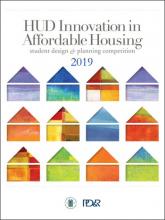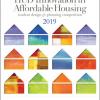0
Interactive
Community:
Resources for integrating resiliency, hope, and wellness in schools
Authored by: Treatment and Services Adaptation Center
Topics: Child welfare, Low-income, Partnerships, Place-based, Research, Safety
 Shared by Mica O'Brien
Shared by Mica O'Brien
Mica O'Brien posted a
on Nov 19, 2018
Treatment and Services Adaptation Center
Resources for integrating resiliency, hope, and wellness in schools
0
Interactive
Community:
Nov 14, 2018
After decades of sprawl and suburban dominance, U.S. cities are experiencing rebounding populations, growing employment, and new public and private sector investments in places that are walkable, transit-oriented, and support diverse people and amenities. But we know that the benefits of these trends are not equally distributed, presenting an urgent opportunity for local and regional leaders to advance place-led development that produces better economic outcomes for more people in more places.
To help deliver on that imperative, the Metropolitan Policy Program at Brookings launched the Anne T. and Robert M. Bass Center for Transformative Placemaking (“Bass Center”) with an event on Wednesday, November 14. In collaboration with Project for Public Spaces (PPS) and the National Main Street Center (NMSC), the Bass Center will inspire public, private, and civic sector leaders to make transformative place investments that generate widespread social and economic benefits. Brookings President John Allen, Bass Center Director and Senior Fellow Jennifer Vey, special guest speaker Carol Coletta, and a distinguished panel of experts discussed how market and demographic trends are driving new demands for placemaking that benefit more people and places.
Authored by: The Brookings Institution
Topics: Community development, Housing, Partnerships, Place-based, Safety, Stability
 Shared by Mica O'Brien
Shared by Mica O'Brien
Mica O'Brien posted a
on Nov 19, 2018
The Brookings Institution
After decades of sprawl and suburban dominance, U.S. cities are experiencing rebounding populations, growing employment, and new public and private sector investments in places that are walkable, transit-oriented, and support diverse people and amenities.
0
Report
Community:
Nov 16, 2018
Housing and school segregation function as mutually-sustaining phenomena that limit perceived housing and school choices, constrain social networks, and curb employment and educational potential. Despite the link between housing and school segregation, however, many initiatives combating segregation tend to focus on one or the other instead of recognizing their inherent connectedness.
Authored by: Phillip Tegleler and Micah Herskind for the Poverty and Race Research Action Council
Topics: Data sharing, Dual-generation, Education, Housing, Legislation & Policy, Low-income, Mobility, Partnerships, Racial inequalities, Research
 Shared by Mica O'Brien
Shared by Mica O'Brien
Mica O'Brien posted a
on Nov 16, 2018
Phillip Tegleler and Micah Herskind for the Poverty and Race Research Action Council
Housing and school segregation function as mutually-sustaining phenomena that limit perceived housing and school choices, constrain social networks, and curb employment and educational potential.
0
Podcast
Community:
Josie Williams, Project Coordinator at the Greensboro Housing Coalition, joined the podcast to discuss a BUILD-funded project called “Collaborative Cottage Grove” that is fostering resident-led efforts to improve poor housing conditions that are leading to asthma-related emergency department visits in the Cottage Grove neighborhood of Greensboro, NC. Motivated by a desire to improve conditions in neighborhoods similar to the one she grew up in, and guided by resident voices, Williams is working with multi-sector partners to map asthma hospital visits and housing condition data to identify areas in need of support. The collaborative is also in the process of developing an electronic referral system to link families with asthma education and housing assessments.
Authored by: All In: Data for Community Health
Topics: Asthma, Data sharing, Health, Housing, Partnerships
 Shared by Mica O'Brien
Shared by Mica O'Brien
Mica O'Brien posted a
on Nov 8, 2018
All In: Data for Community Health
Josie Williams, Project Coordinator at the Greensboro Housing Coalition, joined the podcast to discuss a BUILD-funded project called “Collaborative Cottage Grove” that is fostering resident-led efforts to improve poor housing conditions that are leading to asthma-related emergency department visits
0
News Article
Community:
Nov 1, 2018
Number of homeless vets falls to approximately 38,000, a 5.3% decline since last year and about half the 73,367 veterans tallied in 2009.
Authored by: Ben Kesling for WSJ
Topics: Homelessness, Housing, Legislation & Policy, Low-income, Metrics, Partnerships
 Shared by Mica O'Brien
Shared by Mica O'Brien
Mica O'Brien posted a
on Nov 2, 2018
Number of homeless vets falls to approximately 38,000, a 5.3% decline since last year and about half the 73,367 veterans tallied in 2009.
0
Policy Brief
Community:
Nov 1, 2018
Colleges and higher education systems can make institutional policy changes to bolster the success of students who are parents and their families through intentional use of a two-generation approach. This brief focuses on traditional two-year and four-year baccalaureate pathways for students who are parents; it complements a brief released on policy solutions.
Authored by: Ascend: The Aspen Institute
Topics: Dual-generation, Education, Low-income, Partnerships, Post-secondary, Youth
 Shared by Mica O'Brien
Shared by Mica O'Brien
Mica O'Brien posted a
on Nov 1, 2018
Ascend: The Aspen Institute
Colleges and higher education systems can make institutional policy changes to bolster the success of students who are parents and their families through intentional use of a two-generation approach.
0
Policy Brief
Community:
Nov 1, 2018
There are opportunities for federal and state policies to better support postsecondary institutions in serving students who are parents and their families. Policymakers can incentivize partnerships, name students who are parents as special or target populations, and facilitate financial aid processes that address the needs of families. Where possible, policies can also encourage creative and innovative approaches to leveraging existing programs to facilitate access and successful completion for parenting students. These recommendations seek to promote policy changes that address the critical supports students raising children and their families need for successful completion: affordable and quality child care, financial aid, wraparound services, and workforce readiness.
Authored by: Ascend: The Aspen Institute
Topics: Dual-generation, Education, Legislation & Policy, Partnerships, Post-secondary, Research, Workforce development, Youth
 Shared by Mica O'Brien
Shared by Mica O'Brien
Mica O'Brien posted a
on Nov 1, 2018
Ascend: The Aspen Institute
There are opportunities for federal and state policies to better support postsecondary institutions in serving students who are parents and their families.
0
Policy Brief
Community:
It’s no secret that survivors of domestic and sexual violence make up a large percentage of the families and individuals who seek help from the homeless/housing services system. No one expects homeless/housing programs to become an extension of the victim services system. But the intersection between homelessness and domestic and sexual violence requires both systems to do their work with that reality in mind.
Authored by: National Alliance for Safe Housing
Topics: Child welfare, Domestic violence, Homelessness, Housing, Legislation & Policy, Partnerships, Safety
 Shared by Mica O'Brien
Shared by Mica O'Brien
Mica O'Brien posted a
on Nov 1, 2018
National Alliance for Safe Housing
It’s no secret that survivors of domestic and sexual violence make up a large percentage of the families and individuals who seek help from the homeless/housing services system. No one expects homeless/housing programs to become an extension of the victim services system.
0
News Article
Community:
Sep 24, 2018
The Lake County Housing Authority (Ill.) developed a panel discussion where law enforcement officials, government officials, and those in educational leadership positions were asked to participate and to develop a strategy to confront the issue of race relations in the community.
Authored by: Ashanti Wright for Journal of Housing & Community Development
Topics: Housing, Low-income, Partnerships, Racial inequalities
 Shared by Mica O'Brien
Shared by Mica O'Brien
Mica O'Brien posted a
on Oct 30, 2018
Ashanti Wright for Journal of Housing & Community Development
The Lake County Housing Authority (Ill.) developed a panel discussion where law enforcement officials, government officials, and those in educational leadership positions were asked to participate and to develop a strategy to confront the issue of race relations in the community.
0
Research
Community:
Oct 29, 2018
We examine the implementation of a community health worker (CHW) program in subsidized housing, describe needs identified and priorities set by residents, and summarize participant-reported outcomes.
Authored by: New York University School of Medicine, New York University, Henry Street Settlement, New York University School of Medicine
Topics: East Coast, Health, Housing, Low-income, Partnerships, Place-based, Research
 Shared by Mica O'Brien
Shared by Mica O'Brien
Mica O'Brien posted a
on Oct 29, 2018
New York University School of Medicine, New York University, Henry Street Settlement, New York University School of Medicine
We examine the implementation of a community health worker (CHW) program in subsidized housing, describe needs identified and priorities set by residents, and summarize participant-reported outcomes.
0
News Article
Community:
Oct 23, 2018
In January, mothers with substance-abuse disorders will have a long-term resource to help break the cycle of their addiction. That’s when Tucson Medical Center and CODAC Health, Recovery and Wellness, in partnership with the Connie Hillman Family Foundation, open their new transitional housing program in midtown Tucson for mothers who are battling drug or alcohol addiction.
Authored by: Mikayla Mace for Arizona Daily Star
Topics: Homelessness, Housing, Low-income, Partnerships, Safety, Stability, Substance abuse
 Shared by Mica O'Brien
Shared by Mica O'Brien
Mica O'Brien posted a
on Oct 25, 2018
Mikayla Mace for Arizona Daily Star
In January, mothers with substance-abuse disorders will have a long-term resource to help break the cycle of their addiction.
0
News Article
Community:
Oct 24, 2018
Around the country, there is a growing understanding that survivors of domestic violence often need more than emergency shelter to become safe from violence and establish stable homes. Communities are employing innovative strategies and practices that help address survivors’ unique situations, such as flexible funding and domestic violence rapid re-housing. This momentum is matched by increasing resources from federal, state, and local funders interested in supporting safe housing solutions. But until stakeholders recognize the extent of the need for safe housing, many survivors will continue facing barriers to housing and options for safety.
Authored by: Pef Hacskaylo for How Housing Matters
Topics: Domestic violence, Homelessness, Housing, Legislation & Policy, Partnerships, Safety
 Shared by Mica O'Brien
Shared by Mica O'Brien
Mica O'Brien posted a
on Oct 25, 2018
Pef Hacskaylo for How Housing Matters
Around the country, there is a growing understanding that survivors of domestic violence often need more than emergency shelter to become safe from violence and establish stable homes.
0
Report
Community:
Oct 24, 2018
CLPHA’s Housing Is Initiative is engaged in a number of cross-sector activities focused on developing partnerships, facilitating a community of practice, resource development, promoting best practices, online collaboration, policy and advocacy, and training and education. Read about recent activities in this Fall Update.
Authored by:
Topics: Child welfare, CLPHA, Community development, Cost effectiveness, Data sharing, Early childhood, Education, Family engagement, Funding, Health, Homelessness, Housing, Low-income, Medicaid / Medicare, Mental health, Partnerships, Place-based, Post-secondary, Research, Stability, Substance abuse, Workforce development, Youth
 Shared by Mica O'Brien
Shared by Mica O'Brien
Mica O'Brien posted a
on Oct 24, 2018
CLPHA’s Housing Is Initiative is engaged in a number of cross-sector activities focused on developing partnerships, facilitating a community of practice, resource development, promoting best practices, online collaboration, policy and advocacy, and training and education.
0
News Article
Community:
Oct 16, 2018
Some community colleges have found innovative partnerships with their public housing authorities may help combat student homelessness.
Authored by: Ashley A. Smith for Inside Higher Ed
Topics: Asset building, CLPHA, Education, Homelessness, Housing, Low-income, Midwest, Pacific Northwest, Partnerships, Post-secondary, Stability, Workforce development
 Shared by Mica O'Brien
Shared by Mica O'Brien
Mica O'Brien posted a
on Oct 24, 2018
Ashley A. Smith for Inside Higher Ed
Some community colleges have found innovative partnerships with their public housing authorities may help combat student homelessness.
0
News Article
Community:
Oct 9, 2018
Sweet Water Foundation transformed four blocks in Englewood to cultivate community and help build skills, resources, and opportunities for residents.
Authored by: MacArthur Foundation
Topics: Community development, Family engagement, Food insecurity, Green, Health, Low-income, Midwest, Nutrition, Partnerships, Place-based, Sustainability, Youth
 Shared by Mica O'Brien
Shared by Mica O'Brien
Mica O'Brien posted a
on Oct 24, 2018
Sweet Water Foundation transformed four blocks in Englewood to cultivate community and help build skills, resources, and opportunities for residents.
0
Webinar
Community:
Aug 29, 2018
Half of public housing authorities (PHAs) are engaged in at least one health initiative, almost all in partnership with the health sector, according to a new report by the Council of Large Public Housing Authorities (CLPHA) and the Public and Affordable Housing Research Corporation (PAHRC).Health Starts at Home: A National Snapshot of Public Housing Authorities' Health Partnerships finds that PHAs are key players in addressing the intersection of housing and health and that deepening partnerships between PHAs and health providers can better serve residents' and communities’ health needs.
Stephen Lucas (CLPHA), Keely Stater (PAHRC), and Kelly McElwain (PAHRC) discuss health initiatives taking place at PHAs across the country and strategies for better serving communities with cross-sector partnerships.
Authored by: CLPHA
Topics: CLPHA, Dual-eligibles, Health, Housing, Low-income, Medicaid / Medicare, Mental health, Nutrition, Partnerships, Place-based, Preventative care, Research, Seniors
 Shared by Housing Is
Shared by Housing Is
Housing Is posted a
on Oct 11, 2018
Half of public housing authorities (PHAs) are engaged in at least one health initiative, almost all in partnership with the health sector, according to a new report by the Council of Large Public Housing Authorities (CLPHA) and the Public and Affordable Housing Research Corporation (PAHRC).Health St
0
Interactive
Community:
The NYU Furman Center and Abt Associates have launched LocalHousingSolutions.org, an online, interactive resource to help communities create and implement comprehensive local housing strategies that promote housing affordability. CLPHA was involved with the design of the site as one of forty housing industry stakeholders selected to participate in the National Community of Practice on Local Housing Policy.
Local Housing Solutions offers a new framework for helping cities address affordability challenges as part of a comprehensive and balanced housing strategy. These challenges are complex and interrelated. The goal of the site is to serve as a single-source for local leaders to understand the breadth of available options and identify those that are most appropriate in their communities.
Authored by: Abt Associates and NYU Furman Center
Topics: CLPHA, Housing, Low-income, Partnerships, Research
 Shared by Mica O'Brien
Shared by Mica O'Brien
Mica O'Brien posted a
on Oct 10, 2018
Abt Associates and NYU Furman Center
The NYU Furman Center and Abt Associates have launched LocalHousingSolutions.org, an online, interactive resource to help communities create and implement comprehensive local housing strategies that promote housing affordability.
0
Interactive
Community:
HUD’s Office of Policy Development and Research (PD&R) is pleased to announce the 2019 Innovation in Affordable Housing (IAH) Student Design and Planning Competition. The competition encourages multidisciplinary graduate student teams to submit innovative solutions for a real-world affordable housing project that incorporate design, planning, finance, and larger community elements.
Authored by: PD&R Edge Online Magazine
Topics: Funding, Housing, Low-income, Partnerships, Research
 Shared by Mica O'Brien
Shared by Mica O'Brien
Mica O'Brien posted a
on Oct 10, 2018
PD&R Edge Online Magazine
HUD’s Office of Policy Development and Research (PD&R) is pleased to announce the 2019 Innovation in Affordable Housing (IAH) Student Design and Planning Competition.
0
Report
Community:
Jul 26, 2018
Neighborhoods where insecure housing overlaps with higher rates of emergency department use may be promising areas for interventions under Medicaid value-based payment
Authored by: United Hospital Fund
Topics: East Coast, Health, Housing, Low-income, Medicaid / Medicare, Partnerships, Stability
 Shared by Mica O'Brien
Shared by Mica O'Brien
Mica O'Brien posted a
on Oct 10, 2018
Neighborhoods where insecure housing overlaps with higher rates of emergency department use may be promising areas for interventions under Medicaid value-based payment
0
Report
Community:
Sep 1, 2018
The Roundtable brought together over 70 experts from federal, state, and local government, the private sector, nonprofit organizations, and academia. The objective of the Roundtable was to “explore possibilities and limits of data sharing, and identify successes and proposed solutions for using data to address the opioid crisis.”
Authored by: The Center for Open Data Enterprise
Topics: Data sharing, Health, Partnerships, Substance abuse
 Shared by Mica O'Brien
Shared by Mica O'Brien
Mica O'Brien posted a
on Oct 10, 2018
The Center for Open Data Enterprise
The Roundtable brought together over 70 experts from federal, state, and local government, the private sector, nonprofit organizations, and academia.
0
Publication
Community:
The health care system is transforming to deliver value and maximize health across a patient’s lifespan. In this new landscape, there is rapid adoption of health technology to deliver patient-centered, whole person care. This issue brief explores elements for technology applications emerging to “close the loop” between clinical and community services and presents accelerators and challenges to their adoption.
Authored by: Nemours Children's Health Systems
Topics: Child welfare, Data sharing, Early childhood, Health, Partnerships, Youth
 Shared by Mica O'Brien
Shared by Mica O'Brien
Mica O'Brien posted a
on Oct 10, 2018
Nemours Children's Health Systems
The health care system is transforming to deliver value and maximize health across a patient’s lifespan. In this new landscape, there is rapid adoption of health technology to deliver patient-centered, whole person care.
0
Webinar
Community:
Oct 8, 2018
During this All In webinar, Caroline Fichtenberg of SIREN reviewed the current landscape of assessment tools and outcomes measures for social needs. Karis Grounds of 2-1-1 San Diego explained how they incorporated social needs assessment into their Risk Rating Scale, which helps them better serve clients while showing the impact of their services.
Authored by: All In: Data for Community Health
Topics: Data sharing, Health, Low-income, Metrics, Partnerships, West Coast
 Shared by Mica O'Brien
Shared by Mica O'Brien
Mica O'Brien posted a
on Oct 10, 2018
All In: Data for Community Health
During this All In webinar, Caroline Fichtenberg of SIREN reviewed the current landscape of assessment tools and outcomes measures for social needs.
0
Webinar
Community:
Oct 8, 2018
A growing recognition of the importance of social determinants of health (SDOH) has led to a proliferation of screening and assessment tools, but there are currently no national standards for how to systematically capture and address the non-health needs of patients. To provide some guidance for communities just starting out on this path, All In: Data for Community Health hosted a webinar featuring two subject matter experts.
Authored by: All In: Data for Community Health
Topics: Data sharing, Health, Metrics, Partnerships
 Shared by Mica O'Brien
Shared by Mica O'Brien
Mica O'Brien posted a
on Oct 10, 2018
All In: Data for Community Health
A growing recognition of the importance of social determinants of health (SDOH) has led to a proliferation of screening and assessment tools, but there are currently no national standards for how to systematically capture and address the non-health needs of patients.
0
Webinar
Community:
Oct 9, 2018
CLPHA’s Education Working Group hosts a webinar with Bright by Text, a texting platform that connects caregivers with tools for improving educational outcomes for children. Bright by Text’s President and Senior Program Manager share information about their partnerships with housing authorities and non-profit housing providers across the country, providing insight into the benefits of connecting with residents through technology. CLPHA members who work with Bright by Text outline their respective initiatives and discussed local program goals.
Authored by: CLPHA
Topics: Child welfare, CLPHA, Dual-generation, Early childhood, Family engagement, Health, Home visiting, Housing, Housing Is Working Group, Partnerships, Place-based, Preventative care, Safety, School-readiness
 Shared by Mica O'Brien
Shared by Mica O'Brien
Mica O'Brien posted a
on Oct 10, 2018
CLPHA’s Education Working Group hosts a webinar with Bright by Text, a texting platform that connects caregivers with tools for improving educational outcomes for children.
0
Publication
Community:
Sep 1, 2018
This guide aims to provide resources and advice from the experiences of those in the NNIP network and other related organizations on developing a strong data governance program and protecting the security of confidential data.
Authored by: Leah Hendey, Amanda Gold, and Kathryn L.S. Pettit for National Neighborhood Indicators Partnership
Topics: Community development, Data sharing, Partnerships
 Shared by Mica O'Brien
Shared by Mica O'Brien
Mica O'Brien posted a
on Oct 10, 2018
Leah Hendey, Amanda Gold, and Kathryn L.S. Pettit for National Neighborhood Indicators Partnership
This guide aims to provide resources and advice from the experiences of those in the NNIP network and other related organizations on developing a strong data governance program and protecting the security of confidential data.






 Shared by Housing Is
on Oct 11, 2018
Shared by Housing Is
on Oct 11, 2018








